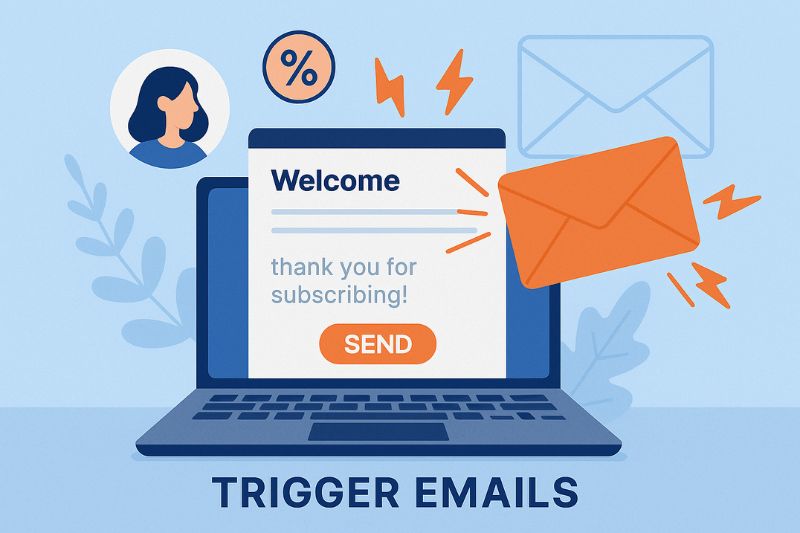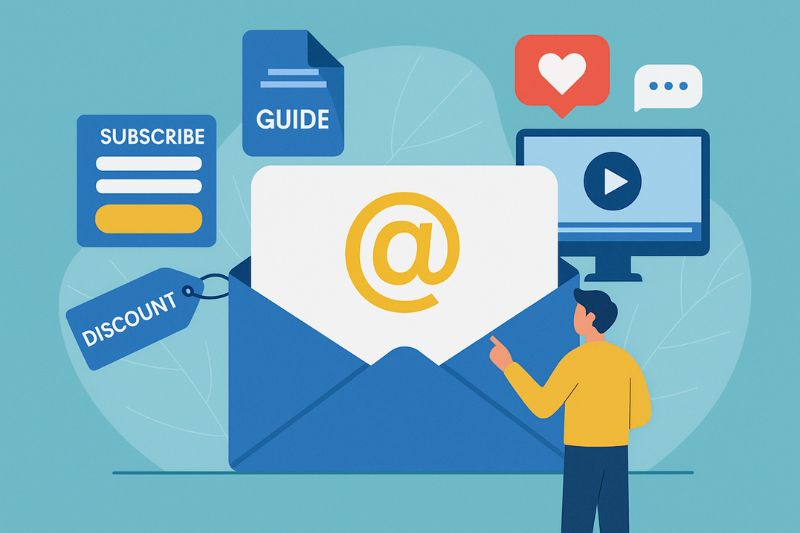About the author:
Darren Blumenfeld is the CEO and Founder of InboxAlly, an email deliverability platform trusted by growth-focused marketers. He’s previously founded HonestMail, worked at NASA, and holds degrees from Tufts and Columbia. His passion for tech, education, and creativity continues to inspire innovation in email outreach.
Trying to grow an audience, build loyalty, or drive conversions? Then you’ve likely asked yourself: Should I focus on email marketing or social media platforms?
Maybe you’ve got a decent amount of social media followers, but no idea if it’s actually helping sales. Or you’re sending out your latest email marketing campaign, but wondering if it’s worth it when TikTok gets all the buzz. Either way, you’re not alone, and this isn’t just a “pick your favorite channel” kind of decision.
The truth is, both social media and email have their place. But they work very differently, and the one you choose (or prioritize) depends entirely on your goals.
This guide doesn’t just toss stats at you. We’re going to break down what each channel actually does well, where it struggles, and how to decide which one drives better results for what you need.
Quick Answer:
Social media and email marketing work best when used together. Social builds awareness, while email drives conversions and ROI by reaching subscribers directly.
Key Differences between Email Marketing vs Social Media
Email marketing campaigns and social media channels are two of the most common elements of a successful digital marketing strategy, but they serve different purposes:
- Email is best for direct communication, high engagement, and conversions
- Social is better for visibility, reach, and audience discovery, with 4.9 billion people having active social accounts
- Email gives you ownership of your list, while social relies on algorithm-driven reach
- Most brands benefit from using both email and social, but email is typically the better long-term channel for ROI
Want a quick win? Use social to grow your email list, then let email do the selling.
Pros and Cons of Each Channel
Let’s get something out of the way: email isn’t outdated, and social media isn’t a silver bullet.
Here’s a quick breakdown of what each channel really brings to the table:
| Channel | Best For | Strengths | Weaknesses |
| Direct communication, conversions, and retention |
|
| |
| Social Media | Visibility, brand awareness, and audience growth |
|
|
Social is built for visibility. Email is built for action, whether you’re nurturing a list or reaching out cold. The difference? One relies on algorithms. The other puts you in control.
Ideally, you’re using both, but if you’re choosing where to invest serious time or budget, that’s where things get interesting.
Reach vs Ownership: Who Really Controls Your Audience?
On social media, you can have 10,000 followers and still reach only a fraction of them when you post. That’s not a bug, it’s the business model. Over the years, organic reach has steadily declined, and unless you’re running paid social media ads, the algorithm decides who sees your content.
Email works differently.
If someone’s on your list, you can reach them directly. No bidding for attention. No algorithm roulette. Sure, inbox placement matters (we’ll get to that), but the key advantage is this: email is an owned media channel.
With email:
- You control the message
- You control the timing
- You control the list
- Email lets you follow up with potential customers more directly
With social:
- You’re subject to platform algorithms and policy changes by social media companies that can impact your reach and engagement
Consider this: if a social platform changes its algorithm tomorrow, how would that affect your ability to connect with your target audience? Relying solely on platforms you don’t control can be risky. Building and nurturing your own email list ensures that you maintain a stable and direct line to your audience.
![]()
Email vs Social Media: Performance Metrics
Let’s get into the numbers now, because when it comes to actual performance, email doesn’t just hold its own. It wins.
1. Engagement & Click-Through Rates (CTR)
According to Campaign Monitor’s 2022 Email Marketing Benchmarks, the average email click-through rate is 2.3% across industries.
While email marketing typically reports click-through rates (CTR), social media platforms are more often measured by engagement rate; likes, shares, and comments per reach.
According to Hootsuite, average engagement rates are 1.4% on Facebook and 1.6% on X. While not a perfect comparison, this suggests email often drives more direct action.
2. Visibility
When it comes to email marketing, many industries continue to see open rates above 30%, with top performers exceeding 35%.
Meanwhile, according to ADdictive Digital’s 2025 study, organic reach on social continues to shrink:
| ~5.9% reach. | |
| ~7.6% reach per post | |
| X | ~3% reach. |
These numbers mean that even if you have thousands of Instagram followers, only a small slice will actually see what you post.
Email doesn’t face that limitation. If your message reaches the inbox, and that’s where deliverability tools come in, it’s directly accessible. No algorithm decides who gets it, when, or how often.
3. Conversion Rates & ROI
Most importantly, email converts.
- According to Omnisend’s 2025 ecommerce benchmarks, Email campaign click-to-conversion rates grew by 27.6% and generates between $36 and $40 for every dollar spent
- Compare that to 1.9% for social media ads, on average. While social media ROI is often in the $2–$5 range.
Bottom line? Social media is great for visibility. But if you want engagement, conversions, and long-term ROI, email does the heavy lifting. Email marketing is also easier to track. You own the delivery channel, link clicks, and conversions end-to-end, unlike social platforms that limit measurement.
When to Use An Email Marketing Strategy (With Examples)
Use email marketing when:
- You want to drive conversions, revenue, or repeat actions
- You’re nurturing leads or managing a sales funnel
- You need consistency and control over reach
- You want control over your marketing efforts
Who Should Prioritize Email First?
Email might not be the flashiest channel, but for certain types of businesses, it’s the one that drives the most consistent, scalable results.
Here’s who benefits most from putting email at the center of their marketing:
1. B2B Companies
Whether you’re generating leads, booking demos, or nurturing long sales cycles, email gives you direct access to decision-makers. You can:
- Follow up with prospects who downloaded a lead magnet or attended a webinar
- Share valuable content or case studies without relying on LinkedIn reach
2. Ecommerce Brands
For DTC and online stores, email remains one of the highest-converting channels. You can:
- Recover abandoned carts automatically
- Run post-purchase flows to encourage subscribers to leave reviews
- Offer exclusive promotions to your most engaged customers
According to Omnisend, nearly 30% of email-driven revenue comes from automated flows, not one-off campaigns.
3. SaaS Tools, Coaches, and Online Educators
If you rely on content, onboarding, or trust-building, email is your best friend. You can:
- Guide new subscribers with onboarding emails
- Run evergreen launches or course announcements
- Create sequences that educate while qualifying leads
Email also makes it easy to segment by behavior, so a trial user gets different messages than a paying customer.
When to Use Social Media (With Examples)
Use social media when:
- You’re building brand awareness or launching something new
- You want quick feedback or engagement
- You’re targeting younger generations or baby boomers on multiple platforms
- You don’t yet have an email list
Who Should Prioritize Social Media First?
While email is often better for direct engagement and long-term retention, social media is still the best place to get in front of new people fast, especially if your business thrives on visibility, trends, or community.
Here’s who benefits most from focusing on social first:
1. Creators, Influencers, and Personal Brands
If your business is you, building a following on social channels like Instagram, TikTok, or LinkedIn gives you exposure, credibility, and reach.
- Engage followers with reels, lives, and community comments
- Stay top of mind with frequent, lightweight updates
- Grow through shares, tags, and algorithm boosts
You can always add email later, but social is often where your audience discovers you first.
2. Local Businesses or Event-Driven Brands
Restaurants, salons, photographers, venues, and any small business that thrives on community work well on visual social networks like Instagram and Facebook.
- Share photos of your work, team, or customer moments
- Use Stories and local hashtags to increase foot traffic
- Announce time-sensitive promotions or events
In these cases, social media marketers focus on driving local engagement and foot traffic through timely, visual content.
3. New Brands Without an Audience Yet
If you’re just starting out and don’t have a list, you might prefer social media as it gives you a way to build momentum without needing contacts up front.
- Run giveaways to build buzz
- Collaborate with others in your niche
- Test content styles quickly to see what resonates
Once you’ve built some traction, you can transition that attention into email signups and start building a more reliable, owned channel.
How to Integrate Social Media and Email Marketing
Social media and email both have strengths, but the best marketing strategies don’t choose one or the other. They connect the two, working together to reach potential customers across social media channels and owned channels alike.
Here’s how that looks in practice:
1. Use Social to Grow Your Email List
Social platforms are great for getting in front of new people. You can:
- Run a social media contest that encourages followers to sign up
- Add an opt-in landing page link in your Instagram bio
- Use social icons to connect different social accounts and drive signups
- Promote exclusive content or giveaways behind an opt-in landing
Once someone signs up, you’ve moved them from a platform you don’t control to a channel you do.
2. Use Email to Build Relationships and Drive Engagement
After someone joins your list, email does what social can’t:
- Send personalized, timed follow-ups (welcome sequences, offers, reminders)
- Share product updates, blog posts, or educational content they might miss on social
- Track open and click behavior to segment your list and tailor messages over time
It’s consistent, measurable, and not limited by an algorithm.
3. Let Each Channel Support the Other
You can also:
- Share popular email content on social (like a poll, tip, or announcement)
- Use email data (e.g., top clicks) to guide your social content ideas
- Reconnect with inactive email subscribers through targeted social ads
The takeaway? Use social to capture attention, and email to turn it into something lasting.
When the two channels work together, you get more leads, more conversions, and more control over the entire customer journey.
Final Thoughts: Which Is Better, Email or Social?
Email and social media both have their place in a modern marketing strategy. Social gets you noticed. Email keeps the conversation going.
The smartest brands don’t treat them as competitors; they build systems where each channel supports the other.
But if you’re choosing where to invest for long-term results, the numbers are clear:
- Email gives you ownership
- Email delivers measurable results
- Email delivers better ROI
- And when optimized, it scales without depending on an algorithm
Whether you’re a growing ecommerce brand, a B2B team, or an agency managing campaigns at scale, email isn’t just a tool. It’s infrastructure.
And if you’re sending serious volume, deliverability isn’t optional. It’s the difference between getting seen and getting filtered out. That’s where platforms like InboxAlly come in: helping ensure that your emails land, get opened, and drive action.
Because your list is only as powerful as your ability to reach it.
Frequently Asked Questions


